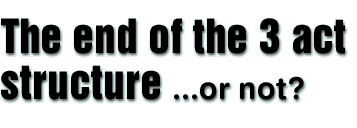|
|
 |
||
|
By Paul Gallagher |
The first films were termed 'actualities' by French film makers. When screened they shocked audiences. It was not that audiences thought watching in 1895 Arrival of a train at La Ciotat by the Lumiere brothers that the train would come through the screen, that it was real, nor did the audience baulk at watching themselves on screen or seeing social conditions of children in poverty. No what so upset viewers was the lack of classical structure - the actualité of the unfolding film - its uncertain screen story. The audience yearned for a familiar fabrication to events.
It did not take long - audiences got what they wanted.
They got the fabricated story. In the famous film Nanook of the North Flaherty composed Nanook's story to fit his romantic conception of eskimo life.
And they got the fabricated ideology. They got violence.
In filming the Spanish - American War, American filmmakers used staged studio footage and cut it with location footage to dramatise and deliver a jingoistic message. Thomas Edison faked his 'Boer War' series. And two types of war records were kept during WW1, the secret and that for public consumption.
And film became a commercial medium, ubiquitous; the corner shop would have screenings! The film was used to sell products and often sold itself through sexual display.
And not much has changed. Advertisers determine what we see. Advertisers censor, the conception of actuality is now more often decided by a production company than an individual auteur. Television programmes can be censored or removed. Ratings are everything. Market research now determines storylines in television melodrama, and the selection of films for production, and even the film's ending. The political control of film makers by Margaret Thatcher during the Falklands War, ensured fabricated pictures. This was carried on into the Gulf War.
So is the individual writer needed? Are writers wanted to just fulfil the brief - the marketing, ideology, or propaganda? We are hearing the future is about the end of linear narratives with computer game scenarios, ever-changing internet stories, and docusoaps allowing us to make up our own stories for camera...
Full article published in Filmwaves - Issue 10, Winter 2000. Subscribe now!